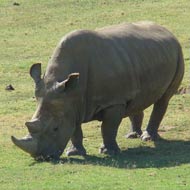
Female northern white dies from ruptured cyst
One of the world's last northern white rhinos has died, leaving just four of the species remaining.
Female rhino Nabiré was resident at the Dvůr Králové Zoo in the Czech Republic. She died on Monday, 27 July from a ruptured cyst.
"It is a terrible loss," said the zoo's director, Přemysl Rabas. "Nabiré was the kindest rhino ever bred in our zoo. It is not just that we were very fond of her. Her death is a symbol of the catastrophic decline of rhinos due to a senseless human greed. Her species is on the very brink of extinction."
Jiří Hrubý, a rhino curator at the zoo, added: "The pathological cyst inside the body of Nabiré was huge. There was no way to treat it."
Nabiré was born at the zoo in 1983 and spent her entire life there. Attempts to breed her were sadly unsuccessful due to the large number of cysts in her utero.
Northern white rhinos are extinct in the wild due to poaching, which is driven by demand for their horn in parts of East Asia and the Arabian Peninsula.
Now, only four northern white rhinos survive - female Nola is located at San Diego Zoo Safari Park and male Sudan and females Nájin and Fatu live at the Ol Pejeta Conservancy in Kenya.
Dvůr Králové Zoo and its partners continue their efforts to save the species. Zoo director Přemysl Rabas said: "It is our moral obligation to try to save them. We are the only ones, perhaps with San Diego Zoo, who have enough of collected biological material to do so. We are aware that our chances are slim, but the hopes are still alive."
As Nabiré's left ovary is healthy, it is hoped she may be a suitable egg donor for in vitro fertilisation. Upon her death, this ovary was removed and taken to a specialised laboratory in Italy. Tissue samples were also collected as they may be useful for scientific research and reproduction work.
Nájin and Fatu may also become egg donors in the future.
Image: Wikimedia Commons



 The Veterinary Medicines Directorate (VMD) is inviting applications from veterinary students to attend a one-week extramural studies (EMS) placement in July 2026.
The Veterinary Medicines Directorate (VMD) is inviting applications from veterinary students to attend a one-week extramural studies (EMS) placement in July 2026.